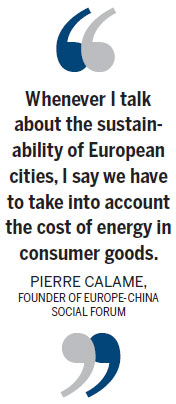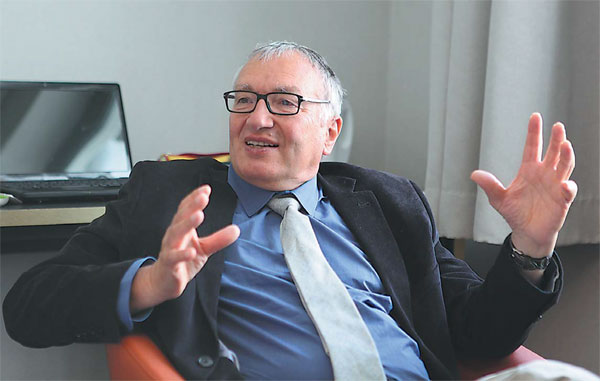Green warrior pleads for change

The man who has been bicyling for 55 years wants the world to get serious about climate change
As the United Nations prepares for its climate change talks in Paris at the end of the year, one of those in the city keenly looking out for a good outcome is Pierre Calame.
Calame, 70, is somewhat of an ecological standard-bearer in the French capital, having never owned a car and always getting around on a bicycle.
| Pierre Calame says China and Europe need to come up with new ways for cities and economic policies to be sustainable. Fu Jing / China Daily |
He reckons that even if riding a bike is a bit trendy now, few Parisians could match his 55-year record of inveterate pedaling.
Calame, founder of the Europe-China Social Forum, based in Paris, says green public transport is a key to curbing greenhouse gas emissions in China, particularly as it undergoes the transformation wrought by urbanization.
"We Europeans have a lot of experience - and that includes making a lot of mistakes - so China can learn a lot from us," says Calame, in his hotel in downtown Brussels after a meeting with an environment official.
As China and the European Union prepared to hold their 17th leaders summit in Brussels, Calame was in the Belgian capital to organize a seminar on sustainable urbanization.
"China and the EU are essential contributors to controlling global warming, and working together on urbanization is a key to doing that," says Calame, who frequently travels to Brussels to let EU officials know his views.
In China, 70 percent of energy goes into industrial production, whereas in Europe the figure is 30 percent, he says, but this does not necessarily mean China's energy system is totally inefficient.
"The main problem is that Europe and all rich countries import goods that are very expensive to produce. In a sense we are exporting our energy needs to China so it can produce goods for us.
"Whenever I talk about the sustainability of European cities, I say we have to take into account the cost of energy in consumer goods."
Europeans are fooling themselves and others if in doing such calculations they do not include the cost of energy used in China to produce the goods they buy, he says.
In working out how sustainable a city is, things that need to be taken into account are energy-efficient housing, energy-efficient transport, and a good food supply, he says.
"But you also have to include the indirect impact of the goods you consume. That's why we are at a critical moment in this dialogue between Chinese and Europeans about sustainable cities."
Sustainable urbanization is not the same as building green cities, he says. Initially it is understandable that the focus is on clean air, good parks and developing environmentally friendly ways of getting around, he says.
"That's OK as far as it goes, but there is more to green cities than that," says Calame, who has promoted people-to-people dialogue between China and Europe for 10 years.
"Sustainable city means you really understand the whole system, what is coming in and what is going out, in terms of energy, work, money, creativity and waste."
Calame says that when he first went to Beijing he pointed out that building more and more ring roads could only be bad, making the capital more crowded and producing more pollution.

"Look at Bejing's ring roads now and you see nothing but traffic jams. You can go nowhere. If right now you had the level of modernization we have in Europe, you'd be dead. As they are now, your cities are unsustainable."
However, he expresses confidence in the Chinese government changing tack on this kind of urbanization.
"I know a huge effort is being put into making that happen."
Most European cities were built using stone rather than bricks, so they have been resilient, he says, but one mistake Europe made was relying too much on industrialization.
As for sustainable development, Calame says China, with Europe and the US, has to face the double challenge of aging and rising unemployment.
"On the one hand we want sustainable development, and on the other we have the problem of unemployment. China has many rural youth who are unemployed, and who want to migrate, and they have to be offered jobs.
"In Europe we say that if we don't get more consumption, unemployment will rise, and in China you are saying the same thing. Governments in China and Europe are exactly the same.
"One day they say we need to stop consumption to save the planet, and the next that we need more consumption to create jobs. For me, it's totally contradictory."
Such thinking is outdated because it does not fit new realities, so China and Europe need to come up with new ways for cities and economic policies to be sustainable, he says.
In the case of cities, the first step would be to spread knowledge about carbon and how it works.
The second would be to think about a systematic transition to a sustainable approach, instead of simply creating demonstration projects.
"But to have a systematic transition, we have to mobilize everyone involved, and that's why our coming forum is about partnership, long-term partnership.
"This is the new stage: how to articulate the efforts of different stakeholders, and that begins with education."
Calame says China and Europe need to prepare young people for their future responsibilities.
"It's not enough to have them good in Chinese and maths. They need to understand what the ecosystem is and to be able to think about their own responsibilities."
That could begin modestly, for example by creating a garden in a school, teaching students how to grow plants, moving on to analyzing how much energy is consumed in the school, and looking at how waste that is produced can be disposed of productively.
"But we need local authorities to assume their own responsibilities with us to change the education system. Everybody understands that it's not enough to have green capital. Recycling in cities needs to be developed."
Calame says the world needs to have new global caps for carbon emissions and these need to be applied to individual cities, too.
The European carbon market is a good start, but is insufficient, he says.
"It's only a carbon market between big companies. We need to widen it."
Ideally, China and the EU should create a partnership that takes account of different sectors, he says.
China and the EU are in what they call a strategic partnership, he says, but there is nothing strategic about it.
"There's too much talk and formality. Strategic is about doing things together in a comprehensive way. Too often at the moment the islands are the good things and the oceans are the bad things. It would be better to change the ocean rather than having to create more islands."
Contact the writers at fujing@chinadaily.com,cn
(China Daily European Weekly 06/26/2015 page30)
Today's Top News
- Japan tempting fate if it interferes in the situation of Taiwan Strait
- Stable trade ties benefit China, US
- Experts advocate increasing scope of BRI to include soft power sectors
- New engine powers cargo drone expansion
- China to boost green industry cooperation
- Manufacturing PMI rises in November































